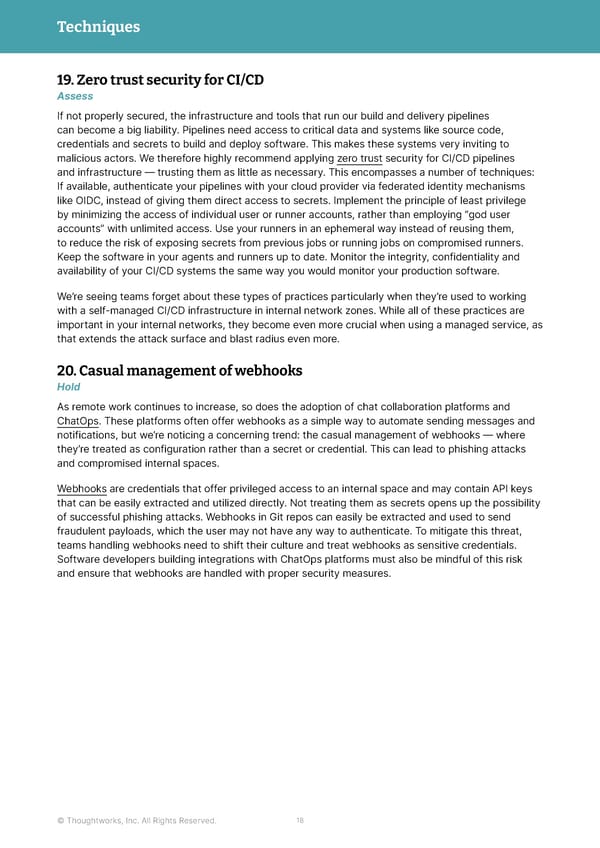Techniques 19.Zero trust security for CI/CD Assess If not properly secured, the infrastructure and tools that run our build and delivery pipelines can become a big liability. Pipelines need access to critical data and systems like source code, credentials and secrets to build and deploy software. This makes these systems very inviting to malicious actors. We therefore highly recommend applying zero trust security for CI/CD pipelines and infrastructure — trusting them as little as necessary. This encompasses a number of techniques: If available, authenticate your pipelines with your cloud provider via federated identity mechanisms like OIDC, instead of giving them direct access to secrets. Implement the principle of least privilege by minimizing the access of individual user or runner accounts, rather than employing “god user accounts” with unlimited access. Use your runners in an ephemeral way instead of reusing them, to reduce the risk of exposing secrets from previous jobs or running jobs on compromised runners. Keep the software in your agents and runners up to date. Monitor the integrity, confidentiality and availability of your CI/CD systems the same way you would monitor your production software. We’re seeing teams forget about these types of practices particularly when they’re used to working with a self-managed CI/CD infrastructure in internal network zones. While all of these practices are important in your internal networks, they become even more crucial when using a managed service, as that extends the attack surface and blast radius even more. 20.Casual management of webhooks Hold As remote work continues to increase, so does the adoption of chat collaboration platforms and ChatOps. These platforms often offer webhooks as a simple way to automate sending messages and notifications, but we’re noticing a concerning trend: the casual management of webhooks — where they’re treated as configuration rather than a secret or credential. This can lead to phishing attacks and compromised internal spaces. Webhooks are credentials that offer privileged access to an internal space and may contain API keys that can be easily extracted and utilized directly. Not treating them as secrets opens up the possibility of successful phishing attacks. Webhooks in Git repos can easily be extracted and used to send fraudulent payloads, which the user may not have any way to authenticate. To mitigate this threat, teams handling webhooks need to shift their culture and treat webhooks as sensitive credentials. Software developers building integrations with ChatOps platforms must also be mindful of this risk and ensure that webhooks are handled with proper security measures. © Thoughtworks, Inc. All Rights Reserved. 18
 Immersive Experience — Vol 28 | Thoughtworks Technology Radar Page 17 Page 19
Immersive Experience — Vol 28 | Thoughtworks Technology Radar Page 17 Page 19